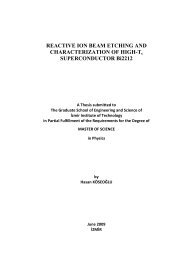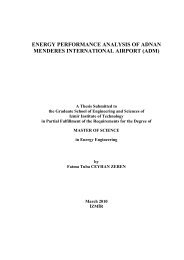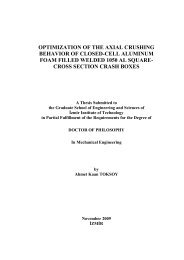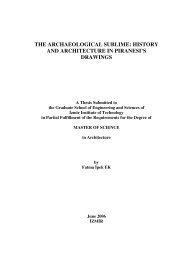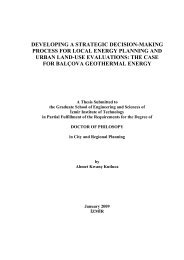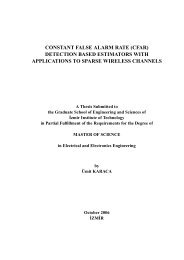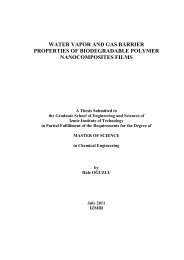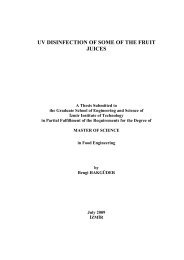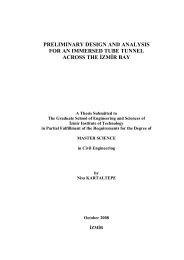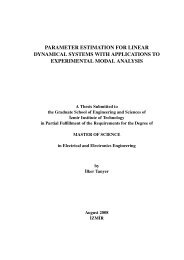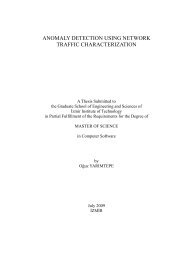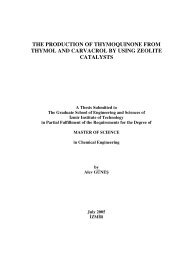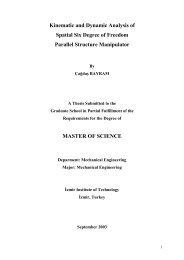a critical evaluation on the concept of justice in planning process
a critical evaluation on the concept of justice in planning process
a critical evaluation on the concept of justice in planning process
Create successful ePaper yourself
Turn your PDF publications into a flip-book with our unique Google optimized e-Paper software.
CHAPTER 5<br />
CONCLUSION<br />
5.1. General C<strong>on</strong>ceptual Evaluati<strong>on</strong><br />
Justice when def<strong>in</strong>ed generally as liv<strong>in</strong>g toge<strong>the</strong>r with differentiati<strong>on</strong>s am<strong>on</strong>g<br />
producti<strong>on</strong> relati<strong>on</strong>s, cultural styles and moral values-it is ra<strong>the</strong>r difficult to c<strong>on</strong>sider this<br />
k<strong>in</strong>d <strong>of</strong> def<strong>in</strong>iti<strong>on</strong> as a whole-come out as an idea / unapplicated project <strong>in</strong> <strong>the</strong> reality <strong>of</strong><br />
today. In parallel with this it is almost impossible to form an universal frame<br />
<strong>in</strong>dependent from time and space which def<strong>in</strong>es <strong>justice</strong> <strong>in</strong> every way. This k<strong>in</strong>d <strong>of</strong><br />
def<strong>in</strong>iti<strong>on</strong> assumpts to c<strong>on</strong>sider <strong>the</strong> existence <strong>of</strong> humank<strong>in</strong>d <strong>in</strong> and toge<strong>the</strong>r with <strong>the</strong><br />
nature universally with<strong>in</strong> <strong>the</strong> c<strong>on</strong>text <strong>of</strong> homogeneity and with<strong>in</strong> <strong>on</strong>ly <strong>on</strong>e culture and<br />
history and it is difficult to talk about <strong>the</strong> reality and currency <strong>of</strong> this assumpti<strong>on</strong>.<br />
Aga<strong>in</strong>st all <strong>the</strong>se, it is necessary to f<strong>in</strong>d a comm<strong>on</strong> field <strong>in</strong> <strong>the</strong> relati<strong>on</strong>s <strong>of</strong><br />
human with nature and human with human <strong>in</strong> a comm<strong>on</strong> universe and accord<strong>in</strong>g to its<br />
existence form. In this sense, m<strong>in</strong>imum standards reached by a c<strong>on</strong>sensus, <strong>justice</strong><br />
pr<strong>in</strong>ciples, and attempts <strong>in</strong> mak<strong>in</strong>g def<strong>in</strong>iti<strong>on</strong>s <strong>of</strong> equality, freedom, <strong>in</strong>terest, and right<br />
about <strong>the</strong> formal organisati<strong>on</strong> pr<strong>in</strong>ciples which will provide <strong>the</strong>se standards <strong>in</strong><br />
c<strong>on</strong>necti<strong>on</strong> with this, cannot be denied. With <strong>the</strong> acceptance <strong>of</strong> <strong>the</strong>se def<strong>in</strong>iti<strong>on</strong>s and <strong>of</strong><br />
<strong>the</strong> existence <strong>of</strong> <strong>the</strong>se frames, <strong>the</strong> fact that <strong>the</strong>se def<strong>in</strong>iti<strong>on</strong>s are hypo<strong>the</strong>tically formed<br />
and evaluated by <strong>the</strong> producti<strong>on</strong> <strong>of</strong> human world should not be disregarded. C<strong>on</strong>sensus<br />
formed <strong>on</strong> hypo<strong>the</strong>tical c<strong>on</strong>cepts change accord<strong>in</strong>g to cultural, ec<strong>on</strong>omic and social<br />
relati<strong>on</strong>s <strong>in</strong> a certa<strong>in</strong> time and space. The transformati<strong>on</strong> <strong>process</strong>es <strong>of</strong> c<strong>on</strong>cepts and<br />
practices <strong>of</strong> human rights and def<strong>in</strong>iti<strong>on</strong>s and practices <strong>of</strong> state show that this <strong>process</strong> is<br />
not synchr<strong>on</strong>ous and homogenous and also evaluated with<strong>in</strong> time.<br />
On <strong>the</strong> o<strong>the</strong>r hand, Rawls and Nozick who search for <strong>the</strong> practicable pr<strong>in</strong>ciples<br />
<strong>of</strong> <strong>justice</strong>, develop two different critics for basis acceptances <strong>of</strong> liberal state, today.<br />
While Rawls propose a revisi<strong>on</strong> <strong>in</strong> <strong>in</strong>creas<strong>in</strong>g <strong>the</strong> equalities <strong>in</strong> distributi<strong>on</strong> relati<strong>on</strong>s <strong>of</strong><br />
modern liberal state, Nozick emphasizes <strong>on</strong> <strong>the</strong> priority <strong>of</strong> freedoms and c<strong>on</strong>sequently<br />
<strong>the</strong> properties and bases <strong>of</strong> neo-liberal state with a neo-liberal perspective. First <strong>of</strong> <strong>the</strong>se<br />
two different viewpo<strong>in</strong>ts that are directed toward <strong>the</strong> c<strong>on</strong>siderati<strong>on</strong> <strong>of</strong> <strong>justice</strong> by modern<br />
183



